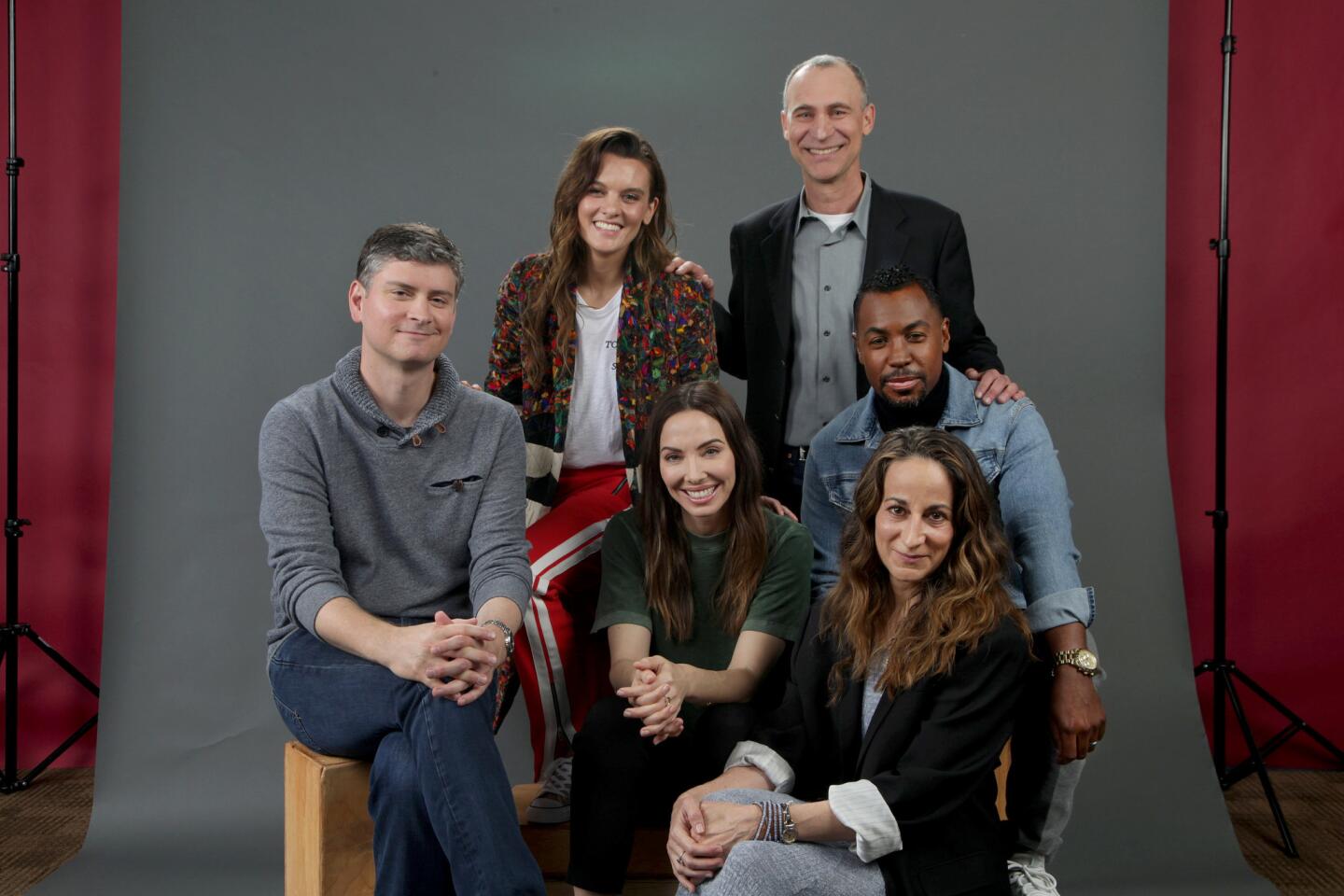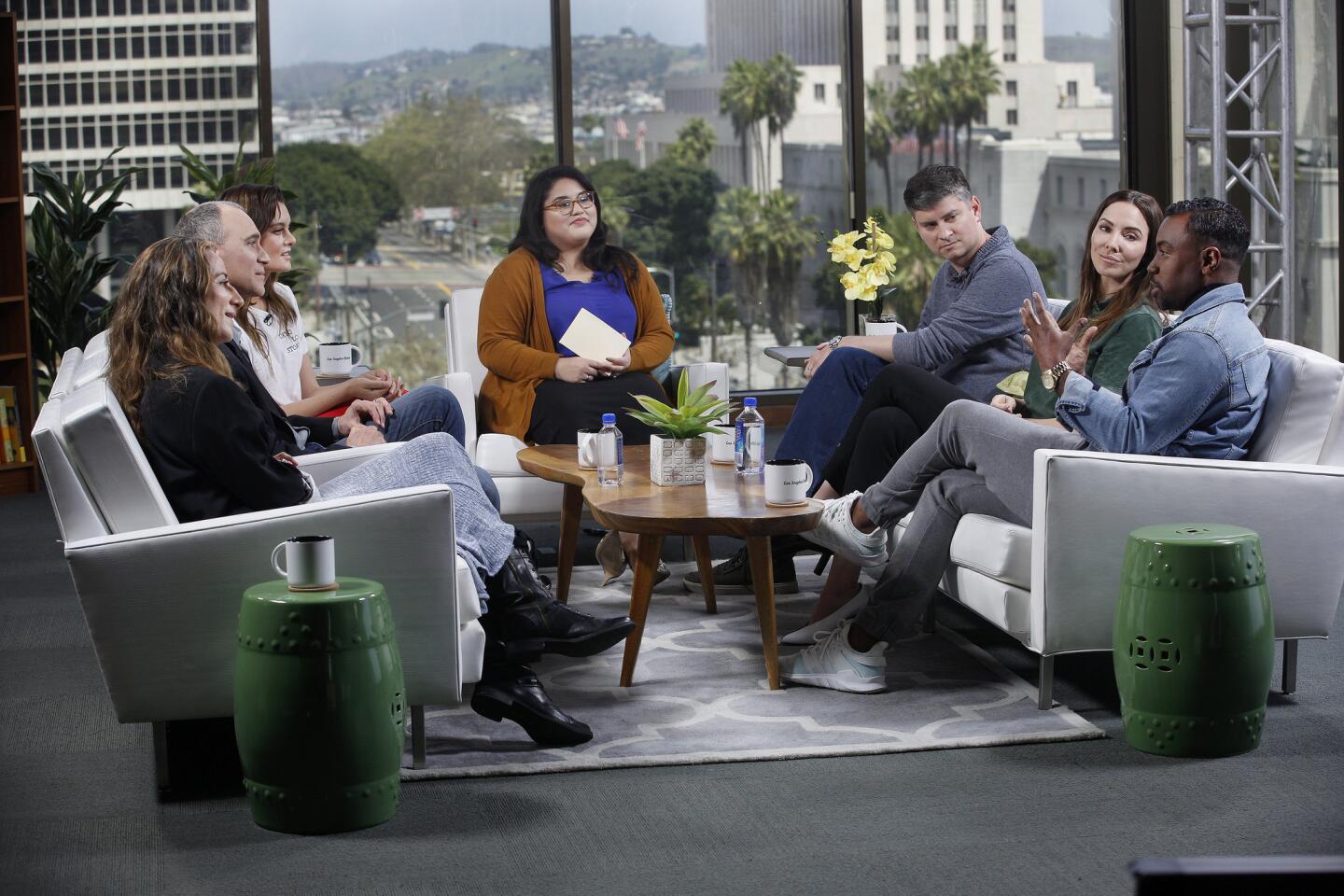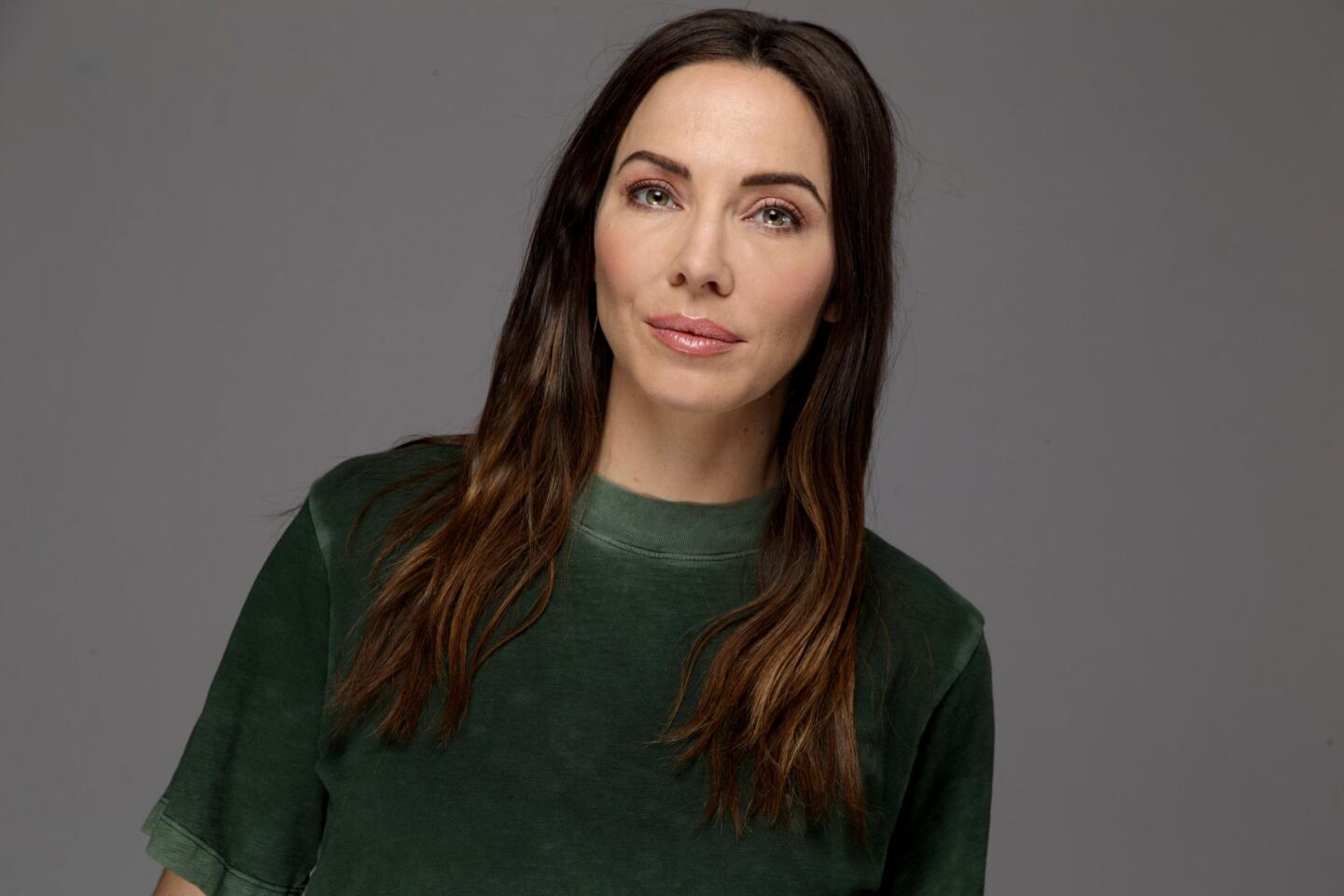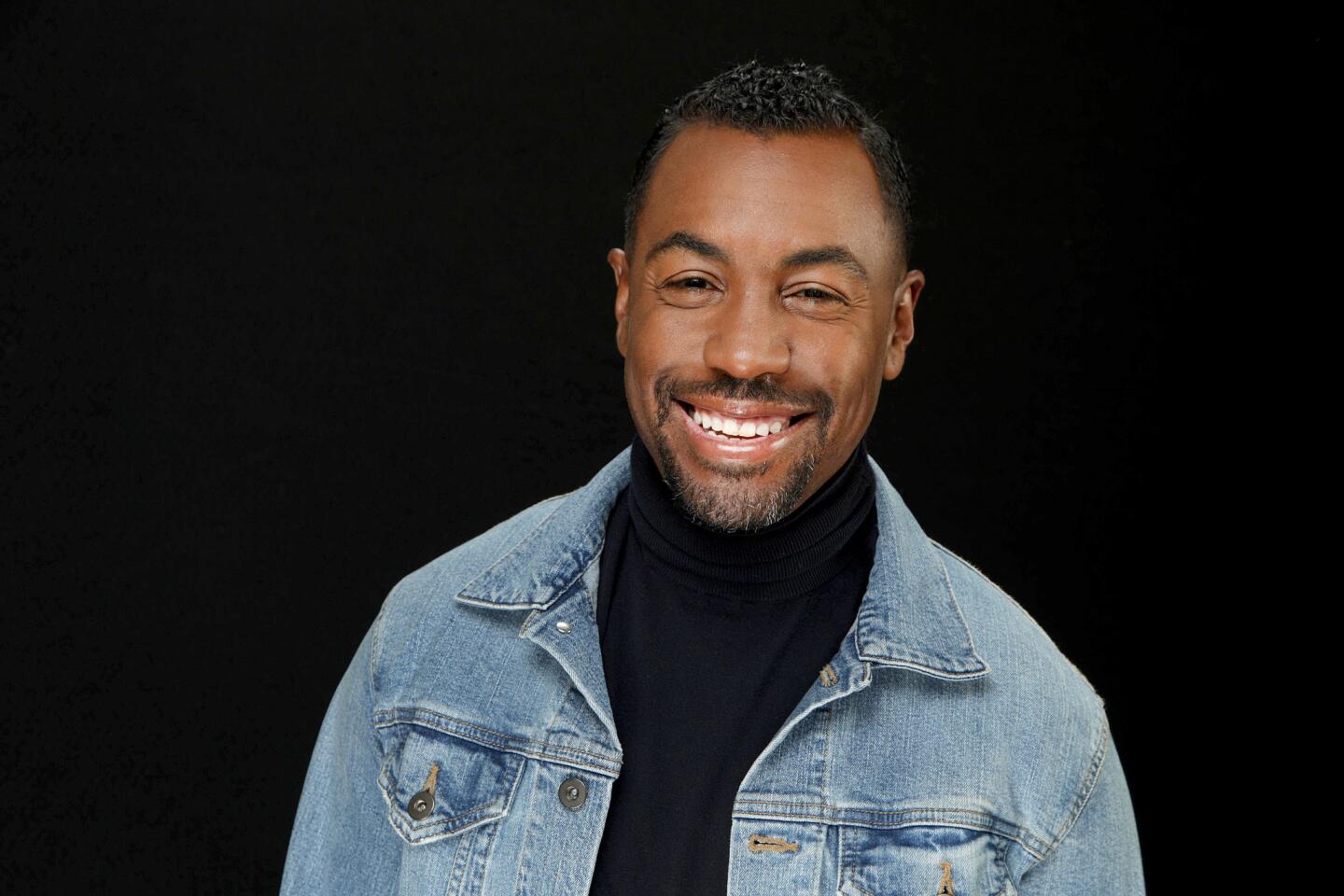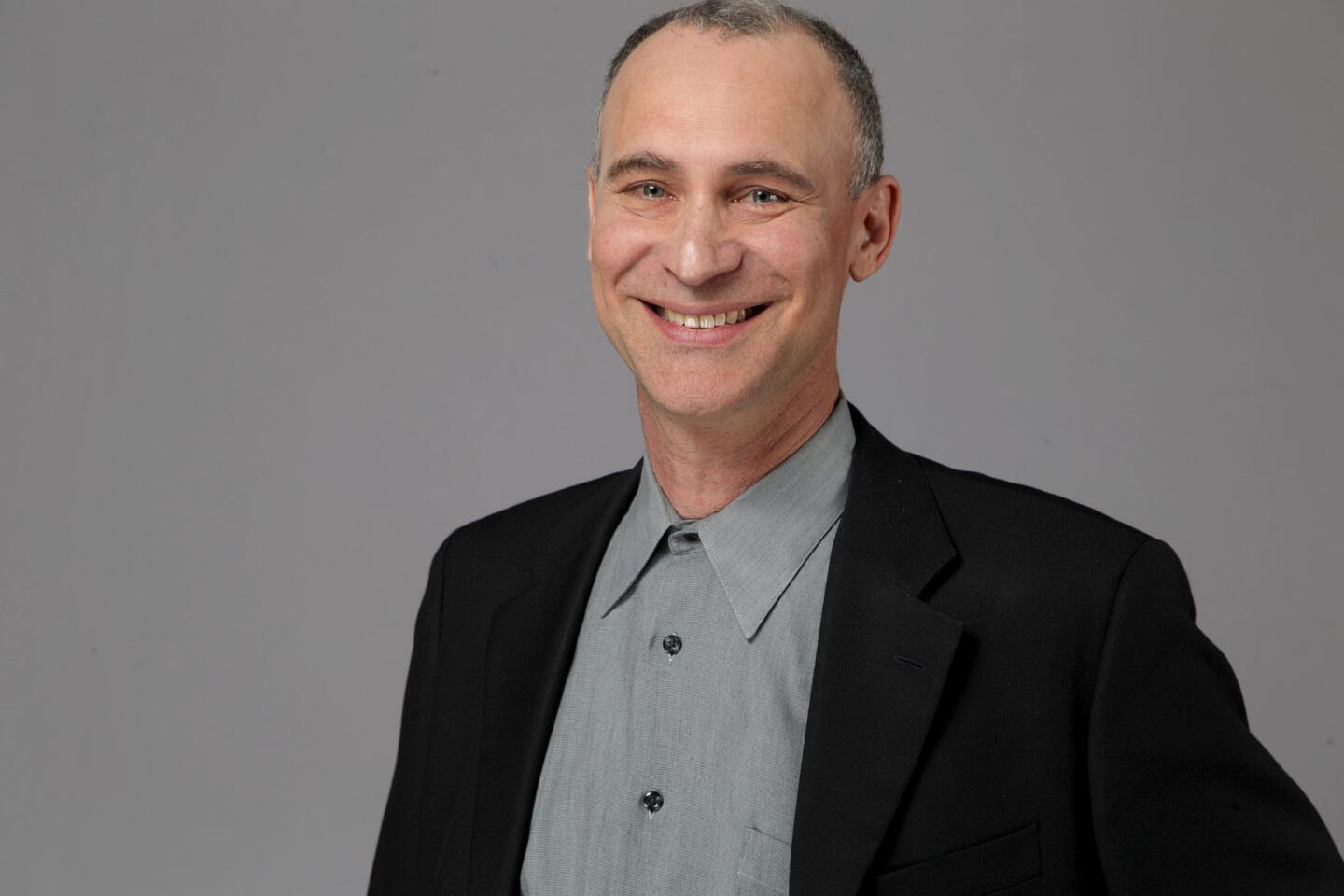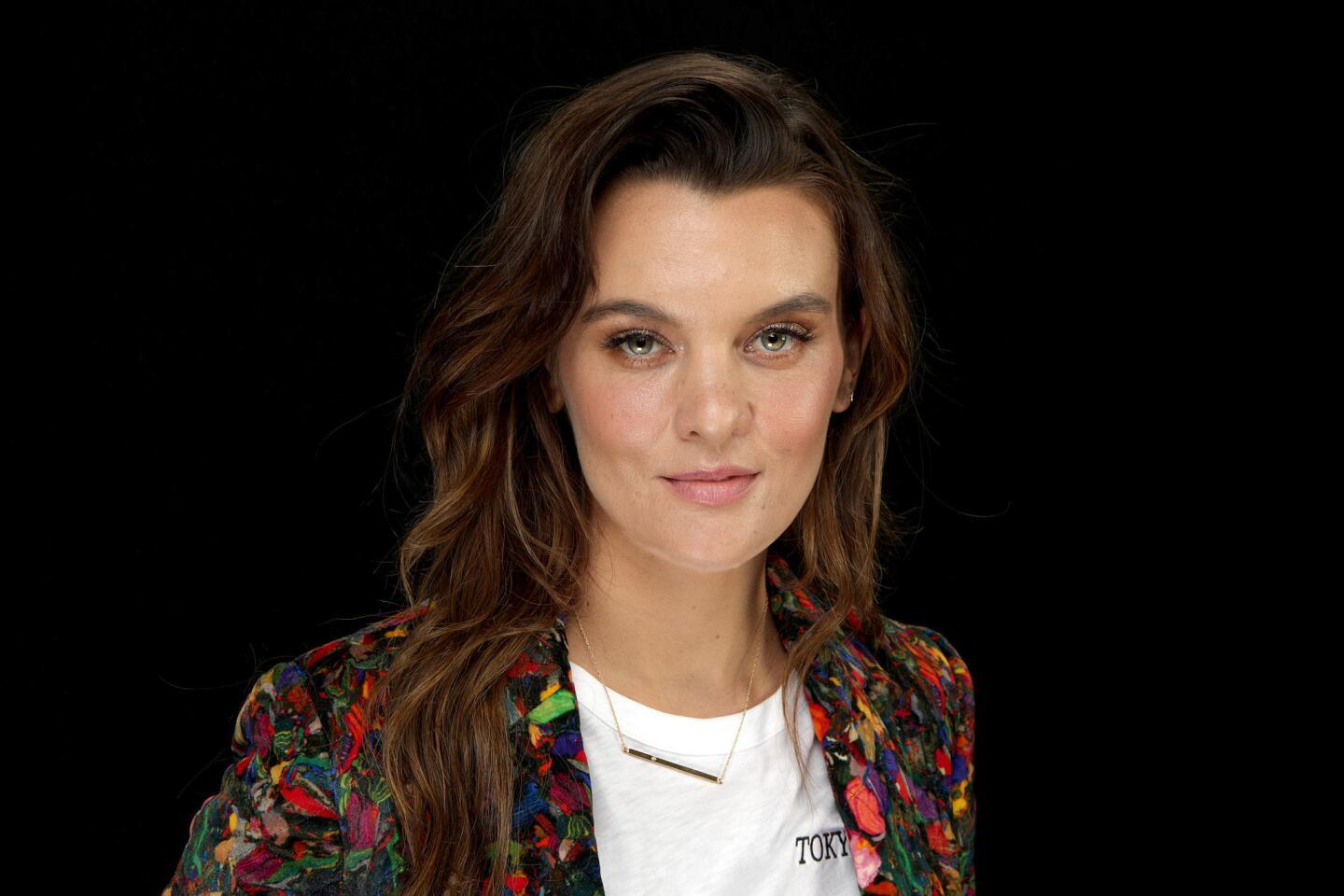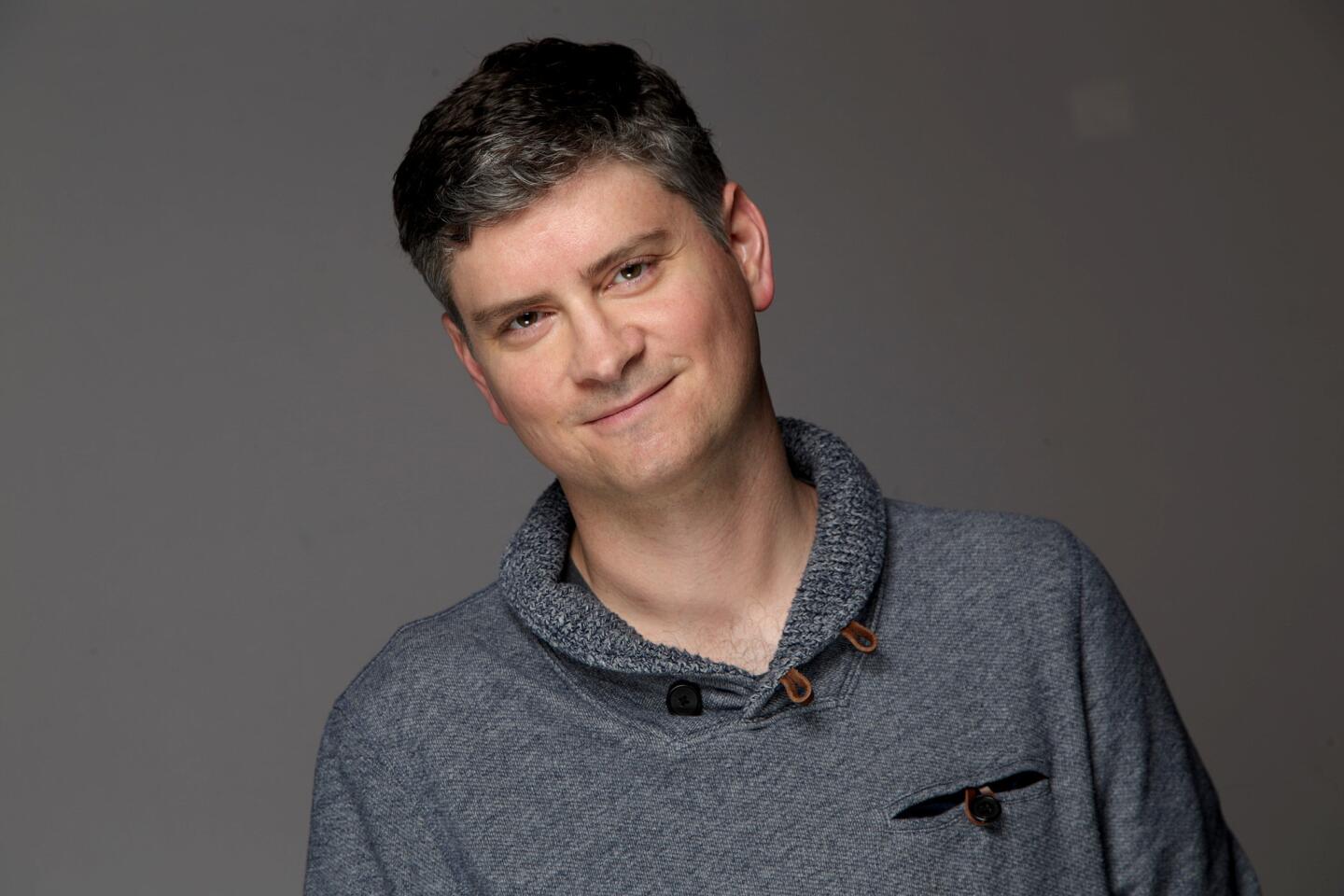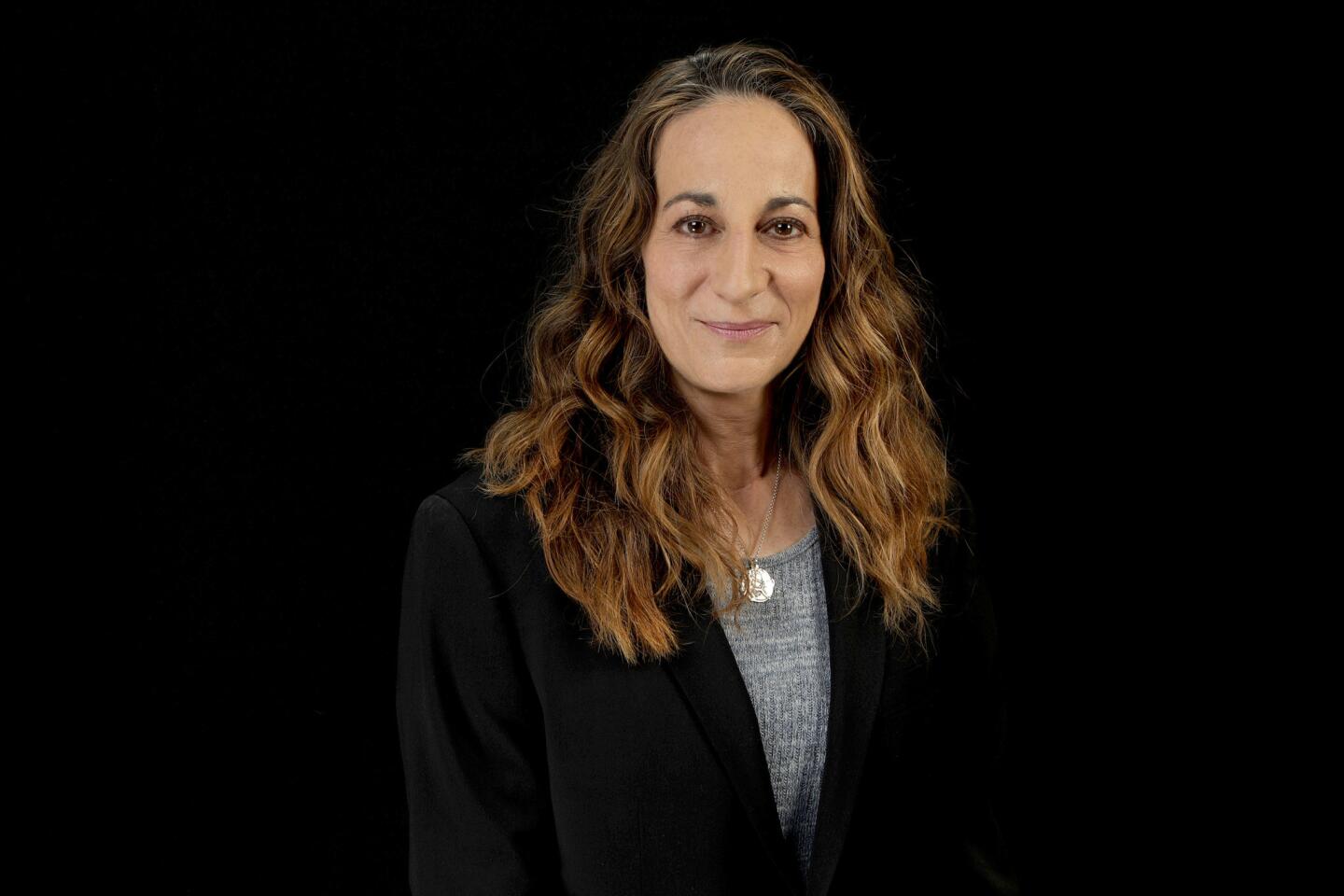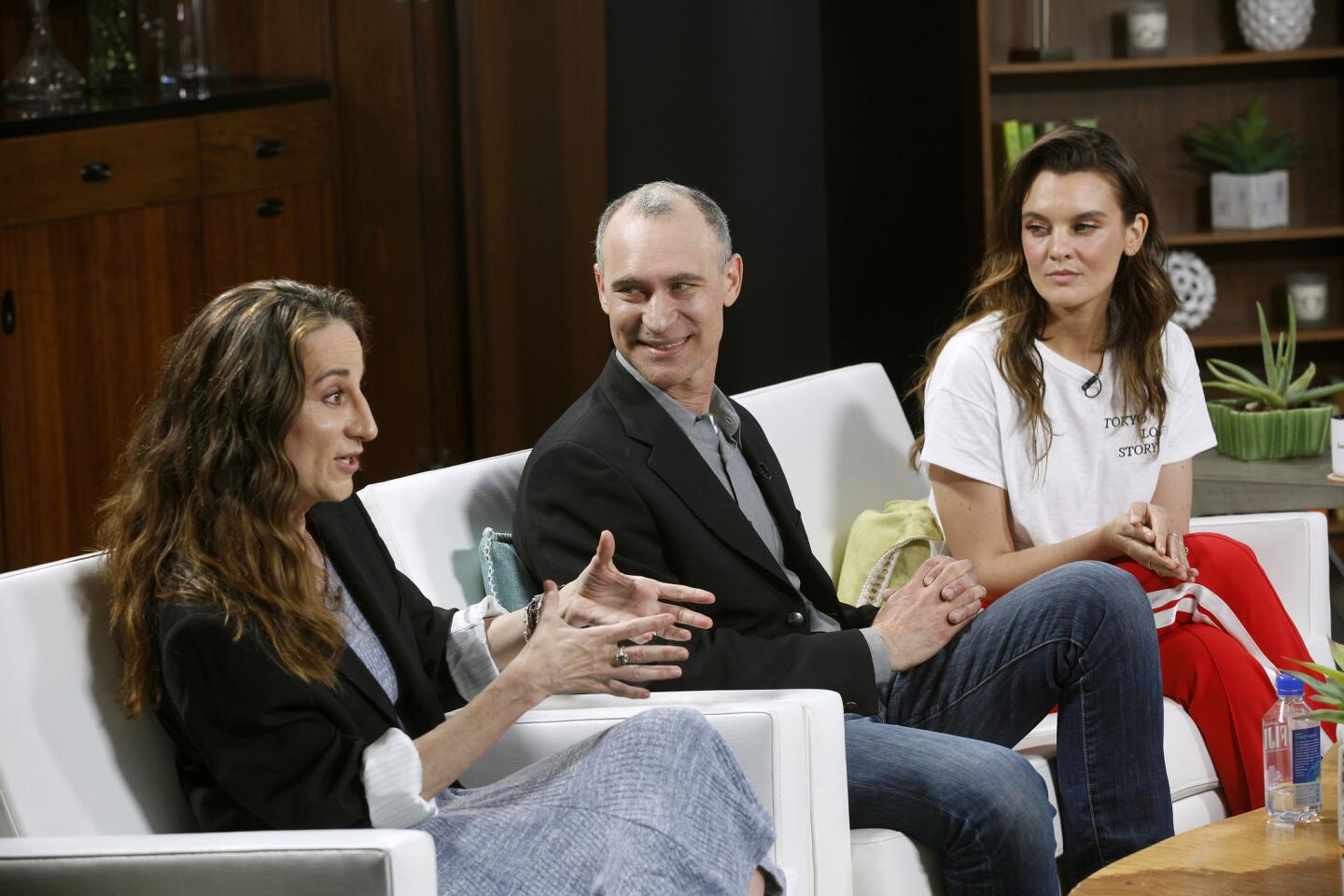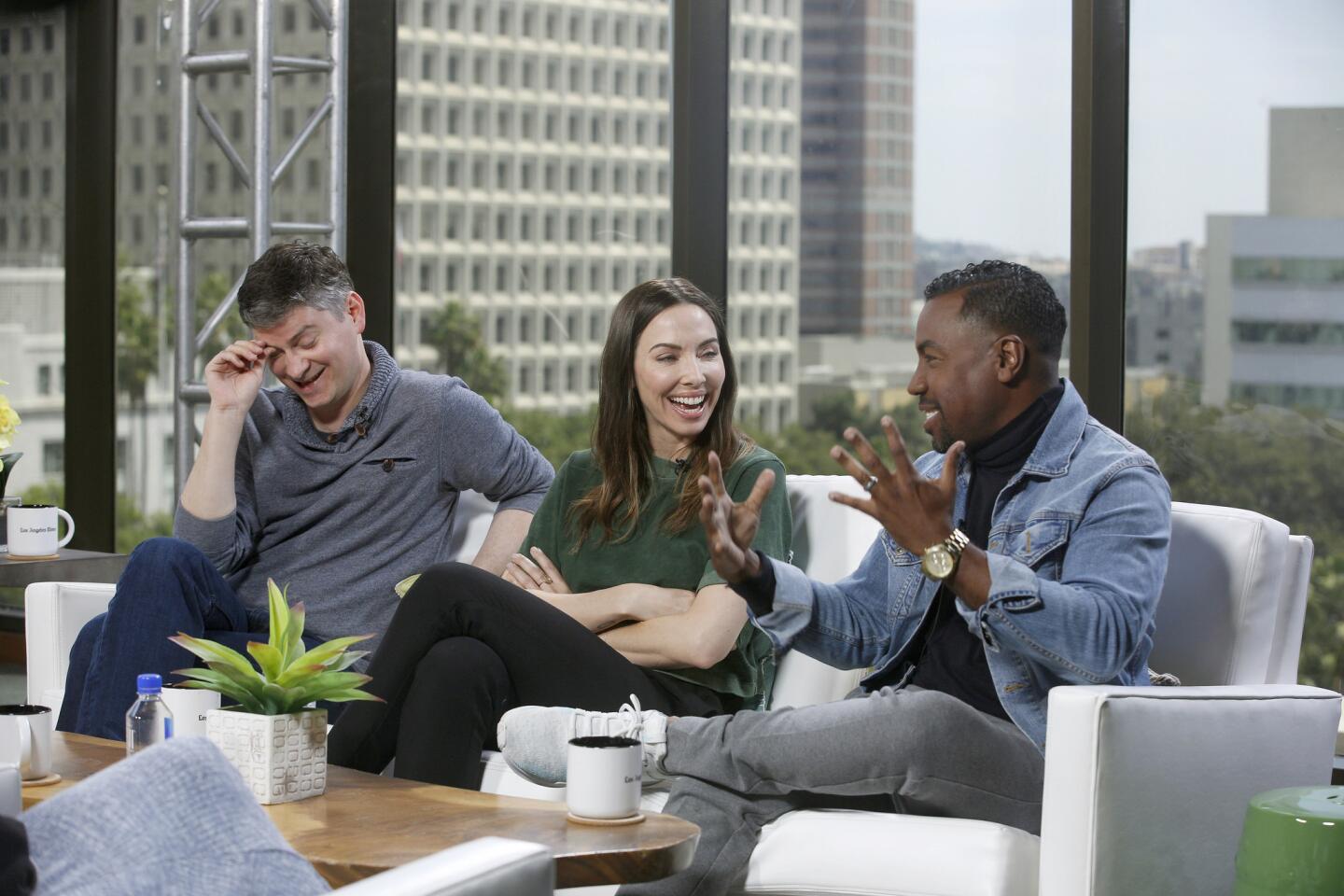Showrunners from âRoseanne,â âThe Americansâ and more on the challenges of standing out in the Peak TV era
In an era of too much TV, creating must-see TV is no easy task. The Envelope gathered six TV masters â Whitney Cummings (âRoseanneâ), Joel Fields (âThe Americansâ), Laeta Kalogridis (âAltered Carbonâ), Prentice Penny (âInsecureâ), Michael Schur (âThe Good Placeâ) and Frankie Shaw (âSMILFâ) â to discuss the creative process. The conversation touched on the responsibility a show has to its audience, being unafraid to push boundaries and knowing when itâs time to bring a show to a close.
You guys have explored sexism, classism, morality, sexual assault, mental illness. Talk about being topical.
Michael Schur: âThe Good Placeâ was explicitly about ethics and morality and it was designed before the current administration. But it has been interesting to be discussing this stuff at a time when the front page of every newspaper, including yours, very frequently has the word âethicsâ in it. So thatâs been interesting, but itâs coincidental.
Whitney Cummings: I am a stand-up [comic] first, so I think that my brain is very attracted to the things that make people uncomfortable, that make people laugh, that piss people off. Anything that Iâm conflicted about is usually something I want to write about. When the idea of âRoseanneâ came across my plate, I was attracted to how controversial the show always was and how controversial the star tends to be. I disagreed with a lot of the things that the show was going to maybe explore. And after the election, I just had a compulsion to be in a room with someone that I disagree with and see if we could find common ground.
WATCH: Video Q&Aâs from this seasonâs hottest contenders Âť
Frankie, at a screening of the pilot, there was a woman there who took real issue with the fact that Bridget, your character, makes a quick run to the corner store while her son is sleeping.
Frankie Shaw: She was demanding to know if I had done it myself. Iâm not claiming to represent every single mother who has ever lived. This is a show that takes place in blue-collar Boston. Thereâs a Latino baby daddy. And, then, itâs very female-centered. A lot of the stories are based on stories that have happened to me or my writers. And so itâs not necessarily, âOh, weâre going to be this issue show.â Weâre just sort of reflecting the world in which the show takes place â and the generational differences when you are in a place where youâre struggling financially.
Joel Fields: On âThe Americans,â the whole show [about Cold War-era Russian spies infiltrating America] was designed to not be topical. It was designed to take a look at an enemy that was no longer an enemy and to examine that time.
Schur: You should have just been like, âYeah we knew.â You should have just claimed you knew it was all going to unfold this way.
Fields: Yeah, Iâm getting a lot of pitches that the next show we do should be about world peace because now thatâll happen.
Schur: Like âThe Secret.â Just put it out there.
Fields: But itâs actually been irritating to have all this stuff happen. My partner Joe [Weisberg] says itâs bad for the show. I like to say itâs bad for the world too. But it sucks because youâre trying to do something that isnât about that, thatâs about getting people to look at identity and look at conflict and look at enemies and look at marriage in a different way, and suddenly itâs now through the prism of whatâs happening in the world today, and itâs no longer universal. But look, none of us can control how the audience is going to experience what we do. And the good news is now the shows we do are around for a long time. So audiences later will experience them in different ways.
Prentice Penny: Yeah, our show went through a weird thing where we started breaking stories during the first season with Obama still in office. And our show is talking about things that people of color talk about privately and then putting those things out publicly. Conversations that we have in our living rooms and with our friends that most of the audiences, you know, certainly mainstream white audiences donât ever get to be a part of. And then the election happened so the beginning [of the season] is a lot of people of color wanting to talk about things that donât get heard, and then the election happened and this sort of veil was off. And a lot of white people were like, âThis is crazy.â
[laughter]
Cummings: You guys didnât know thereâs racism out there?
Schur: Welcome white people. Come in.
[laughter]
Cummings: In comedies, it used to be âHow far can we push the envelope, how can we sort of test people, how can we challenge people, how can we make people laugh?â But then the election happened and it was like thereâs this new social responsibility involved where you want to be edgy and you want to explore and you want to push the envelope, but you also donât want to set a bad example or reinforce stereotypes. Thereâs this whole new floor of like broken glass that you kind of have to walk around.
Penny: But it has to have meaning behind it, sometimes networks want to have you push stuff as opposed to what is it actually saying? Not just throwing something out there for shock value.
Frankie, this is your first time writing. You took a training course?
Shaw: I did the WGA training program for six weeks. But also you canât know until youâre doing it. I think maybe the most surprising part was being faced with your worst qualities and your best qualities. I feel like, âOh, this part of my being uber controlling really works here, but it also maybe doesnât work with this personality.â So youâre just sort of constantly having to be a little bit self-aware and figure out the best way to manage up here and down there. Thatâs been a huge thing for me.
Laeta Kalogridis: It is certainly the most intensity to something that doesnât involve curing cancer. Thereâs a lot of like real deep panicked intensity.
Fields: I learned a lot from working over many years with Steven Bochco, who today I miss a lot. And it was the opposite with Steven. There was never panic. There was always a sure hand. There was always incredible respect. He always had the writerâs back and the writerâs room was a sacred place. And then we tell personal stories, and he was always efficient and calm. And he knew that he could be a leader and that it was also a team sport. So he found this incredible way of running shows.
Penny: One of the things that I always try to take from it is, how do you get the best? Weâre all trying to get to this goal, right? So how do you just try to get the best out of this personâs gifts, that personâs gifts and kind of still shape that into an actual story. And I think that if you hire good people, then youâve done a lot of the heavy lifting because you can trust them now to do those things. One of the things I learned working on âHappy Endingsâ under a showrunner named Josh Bycel â he always told me, âYour life is your life. The show is not your life. Have a life.â I donât always follow it great, but I always go back to it as a benchmark of just being a well-rounded healthy individual because youâre managing so many people, so many circumstances.
Shaw: Right, itâs hard, but itâs definitely also the most fun. If itâs working well, Iâve never laughed harder in my entire life.
Fields: Yeah, Iâm with you. Itâs fun. Itâs joyous. I mean, we all work hard, but weâre not curing cancer. Weâre telling stories. Itâs great.
Cummings: I feel like we all probably say, âWeâre not curing cancer, everybody calm down.â But I remember Michelle Obama did a call to some producers or something. It was a couple of years ago, and she was talking about how the metrics were in for how âWill and Graceâ actually affected the outcome of the marriage equality vote because it was putting gay people in the rooms of people that maybe never met a gay couple before, maybe had prejudices around it. And she was basically like, âPlease put diverse people on your shows.â Weâre not curing cancer, but we kind of are subconsciously helping heal people.
Laeta, youâre in a male-dominated field with this R-rated, sci-fi epic drama on Netflix. Talk about the importance of showing that women can do this.
Kalogridis: For me, the fun is when you get to create these female characters who have all this agency and have all this power in a very dark and chaotic world. The idea that our nightmares â of women and more marginalized people â are just as well explored. We did this sequence thatâs probably the most intense sequence in the entire show. Itâs two women, and it is an all-out knock-down, drag-out fight. One of them is Latina and one of them is Asian, and they fill the whole screen. They are everything and that is very much what the show is about for me, that representational element. I donât have control over how people take it, but I do have control over what we were saying, which is âWatch the ⌠out because itâs coming.â I think anything thatâs trying to do something different is always going to be hard.
Cummings: Yeah, thereâs already what we go through when you make something, âGod, that wasnât good enoughâ and âOh, this could be better, and we should reshoot that.â And now you get the added feedback from Twitter and stuff.
Penny: I had an experience last year with it, and I need to figure out how to be better. We had an episode where the character doesnât use a condom. For the most part, we try to always be responsible. I remember people were like, âYouâre saying black people get this rate of AIDS, and youâre being irresponsible. Youâre showing this.â And I was like, âWell, itâs a TV show. We donât have time to show them go get the condom, cut it open, put it on.â I got into a big debate with people and I was like, âIâm doing so much for black people behind the curtain you guys donât even know.â Like Iâm tearing down the black community and I want AIDS to get black people. It was just crazy.
Cummings: Still, you guys talk about how fun it is. I have been working on a show where the main character voted for Donald Trump. So our room was very tense and stressful and not a safe space. Very triggering, so it was intense but kind of cathartic at the same time. But there was a really big argument in the room about Dan Connor [talking about] undocumented workers taking his jobs because heâs in freelance construction, whether he would say âillegals.â And I was like, âWe canât say that. This is wrong. Itâs racist.â I was so angry. But thatâs what he would say. Heâs not PC. Thereâs a kid on the show in a dress. He would not say gender-nonconforming. Heâs like, âHeâs gay.â
Were you shocked by the numbers that the show receives? And the aftermath of things that have come to light?
Cummings: I donât know what youâre talking about. Yes.
Kalogridis: I think thereâs something really valuable about triggering conversation, in getting people to talk about something. Even, dear God, help us all, if itâs uncomfortable. One of the things that worries me the most is the idea that censorship is in some way virtuous. Censorship is never virtuous. Censorship is just censorship.
Shaw: If you are normalizing certain behavior that might lead to the devaluing of human life, then thatâs the question that we all have to answer when we are creating and if we can justify it. Everyone should feel represented, but weâre also dealing with a bigger thing here where a lot of people are losing their lives.
Schur: To me, thatâs where the discussion about the art and the artist kind of breaks down, because you want to believe as a society that certain things are settled. Like for example, you are not allowed to stand up and say that only white people should be allowed to vote or own property. We ought to consider that a settled issue. The problem is that in the last couple of years guess whoâs back? The people who say that. I thought that as a reasonable society we had sliced off the extreme fringe of violent racist, reductive, absurd attitudes. And now sadly it feels like, âOh, look the Nazis are back. Thatâs fun. Letâs get the Nazis back in.â
Kalogridis: If I present a show in which a man whoâs lived for hundreds of years gets off on killing women. Yes, itâs horrible and Iâm showing violence towards women. Iâm also showing what I think will happen if someone gets into a position of power whose idea of a good time is hurting people and then canât die and becomes so rich.
Penny: Itâs to what you were saying earlier, itâs what is the driving force behind the art? If Iâm showing something thatâs sort of a cautionary tale about this because thatâs my intent versus my intent is to hurt or to be mean or to dismiss.
Cummings: Thatâs super interesting because my intent in terms of working with Roseanne is I would like a liberal, progressive person to be in that room. And I guess Iâm going to have to do it. When you make a show, can you tell the difference between the showâs star and the show they make? I think weâre at a point where you kind of canât.
Schur: Itâs just asking so much of audiences because the show in this case is named after her and itâs based, it was originally based on her stand up, which was based on her real life. And then she goes on Twitter and says all the stuff she says â I just want to say, I believe the question that started this conversation was, âWhatâs the worst network note youâve ever gotten?â
[laughter]
Cummings: The network does say no Nazis a lot to me, I hear that. No Nazis.
Letâs talk about the responsibility to the audience in another way. [To Schur] You pulled off the greatest TV twist when you revealed that âThe Good Placeâ wasnât in fact in the good place. And how did you move forward from that?
Schur: So the twist at the end of Season 1 was baked into the show from the beginning. It was part of what got Ted Danson to sign on. And because we knew about it so early we had a chance with the writers to look forward. So weâve been a sort of a season ahead in terms of being able to anticipate what weâre going to do and we decided pretty early that because the twist at the end was so world upending that we didnât want to try to outdo ourselves.
[To Fields] How about knowing when itâs time to wrap things up?
Fields: Joe and I talked from early days about what the end was. And I think we were towards the end of Season 2, beginning of Season 3, when [FX chief] John Landgraf came to us and said, âHow many seasons do you think you need to tell the story?â And Joe and I took a long walk and sort of pitched out two versions. It was pretty clear to us that it was going to be six seasons. We tried a version that was five for a day, and it just wasnât enough room. So we were able to write to that from early on and that was really liberating.
Cummings: In network TV, you just write the finale for every season.
More to Read
From the Oscars to the Emmys.
Get the Envelope newsletter for exclusive awards season coverage, behind-the-scenes stories from the Envelope podcast and columnist Glenn Whippâs must-read analysis.
You may occasionally receive promotional content from the Los Angeles Times.
